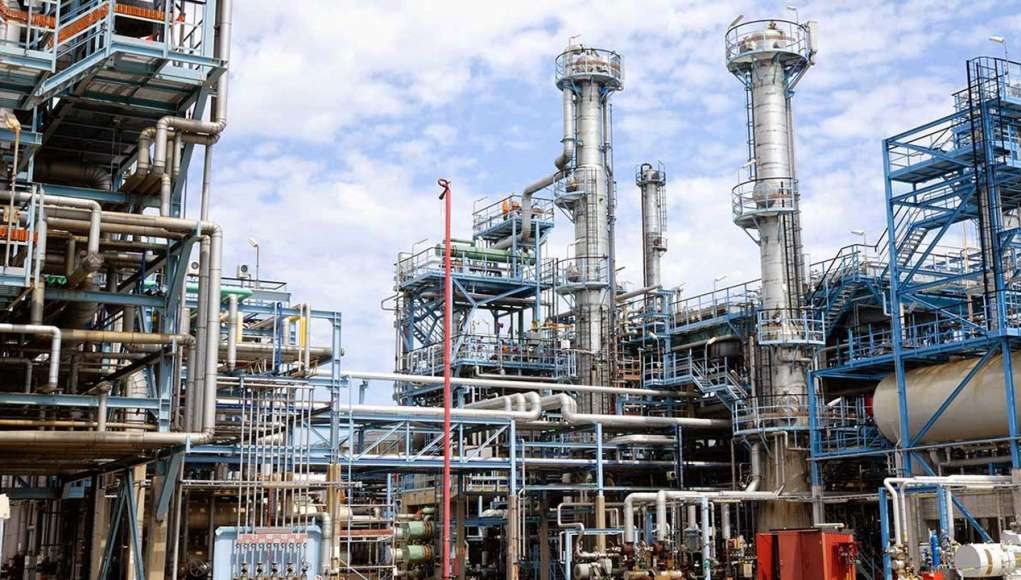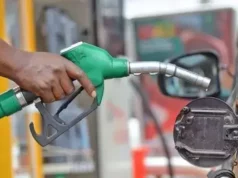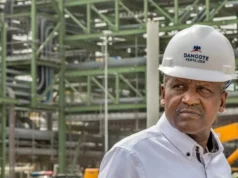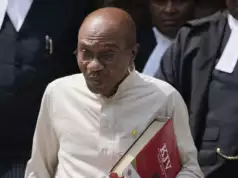The Federal Government may save about N35tn in fiscal expenditure within the next five years with the commencement of operations at the Dangote Refinery and Petrochemicals.
The Governor of the Central Bank of Nigeria, Godwin Emefiele, disclosed this on Monday during the ceremony to inaugurate the Dangote Petroleum Refinery and Petrochemical facility in Ibeju-Lekki, Lagos.
President Muhammadu Buhari who inaugurated the refinery, which is currently the world’s largest single-train petroleum refiner, said his regime had been deliberate about ensuring public-private partnerships.
He described the refinery as a milestone for the Nigerian economy and a game-changer for the downstream petroleum market in the African continent.
Buhari said, “I recall that just about a year ago, I was here to commission your fertiliser (plant) and had the opportunity to briefly inspect this refinery complex which was under construction. The Group Chairman, Aliko Dangote, assured me that the refinery will be ready for commissioning before the end of my tenure.
“I’m aware that this is not the first time that the Dangote Group under Alhaji Aliko Dangote’s leadership is putting Nigeria on the global map through his bold investments in key industries. This has helped to transform our economy from heavy import dependence to a net exporter in some critical industries including cement and fertiliser.”
At the inauguration, which had in attendance senior government officials from Nigeria and other African countries, Buhari described the refinery as a game-changer, just as the Founder/Chairman, Dangote Group, Aliko Dangote, declared that the facility would put an end to the inflow of toxic substandard petroleum products into Nigeria.
The project was inaugurated at the Dangote Industries Free Zone, Ibeju-Lekki, Lagos State. It was attended by governors, lawmakers, government functionaries, royal fathers, captains of industries and prominent Nigerians from all walks of life.
According to the president, Nigeria’s economy, which has been stressed for many years and over a decade of insurgency, has also been severely impacted by several external crises including the global financial crisis, the collapse of oil prices, the Coronavirus pandemic, and the Russia-Ukraine war.
The consequences of these challenges, he said, constituted a severe strain on the economy, limiting government’s ability to provide basic infrastructure without resorting to huge borrowing.
He said, “Our government, therefore, focused its attention on creating an enabling environment for the private sector to thrive and fill the enormous gap in investments, not only in infrastructure, but also in all critical sectors.”
Dangote also stated that the refinery would start delivering refined products to the Nigerian market from July this year, as operators urged the Federal Government to ensure transparency in the supply of crude oil to the 650,000 barrels per day crude oil processing refinery.
Speaking at the event, the founder of the refinery, Dangote, said, “It is our firm commitment that we will replicate in this sector what we have actually achieved in the cement and fertiliser markets, while Nigeria transformed from being the largest importer of these crude products to a net exporter.”
He pointed out that the “first goal is to ramp up projections of various production to ensure that within this year, we are able to fully satisfy our nation’s demand for higher quality products to enable us to eliminate the tragedy of import dependency and stop, once and for all, the dumping in our market of toxic substandard petroleum products.
“Our first products will be in the market before the end of July, beginning of August this year.”
He also said the refinery plans to export to 53 African countries which depend on other countries for petroleum products.
Meanwhile, Emefiele said the Dangote Refinery and Petrochemicals could spare Nigeria about N5tn to N7tn annually in the fiscal expenditures of the federal government over the next five years.
He noted that the project would support the fiscal operations of the government, easing budget constraints of funding fuel subsidy.
The CBN governor added that the cost of fuel subsidy may hit N4.4tn by the end of 2022.
He said, “This project will equally provide support to the fiscal operations of the government as it could help ease budget constraints of funding the petroleum subsidy and engender fiscal savings. Available data indicate that, over a five-year period, fuel subsidy in Nigeria rose more than nine-folds from about N154bn in 2017 to over N1.43tn before another three-fold rise to N4.4tn by the end of 2022.
“A simple straight-line projection suggests that this figure could surpass N7tn within the next three years if we do not tackle it effectively. Thankfully, the Dangote Refinery and Petrochemicals could spare Nigeria about N5tn to N7tn annually in fiscal expenditure of the federal government over the next five years.”










